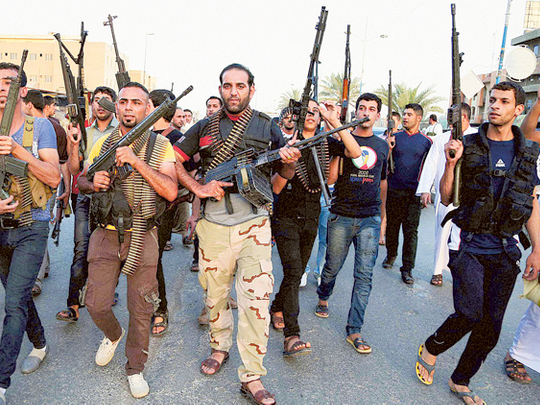
Dubai: The Middle East and countries like Afghanistan and Pakistan are currently reeling under the impact of violent sectarianism and rising extremism. This situation has reached a stage wherein the very existence of some nation states as united entities is under question.
“We are witnessing a war to consolidate sectarian divisions. Co-existence has become impossible,” said Abdel Bari Atwan, Gulf News columnist and editor-in-chief of digital newspaper Rai alYoum. Speaking to Gulf News from London, he said that there is currently a break-up of regional states under way. “There are going to be three states in Libya, three in Iraq and maybe three to four in Syria. We are reaching a stage where we will have city-states.”
But Atwan doesn’t believe that the rise in extremism is because of mainstream Muslims accepting the extremist groups. “What we see is sectarian polarisation. Each side is trying to use maximum lethal force against the other. People are not accepting these groups but are trying to adapt themselves to live with this chaos.”
Groups like the Islamic State of Iraq and Levant (Isil) and Jabhat Al Nusra control large swathes of territory in Syria and Iraq. The Taliban insurgency in Afghanistan and Pakistan shows no signs of abating. So what is behind the resurgence of extremist groups?
Professor Fawaz Gerges, a Middle East expert at the London School of Economics, told Gulf News that one cannot understand this resurgence without understanding the deep social, sectarian and ideological fault lines that exist in the Arab and Muslim world. “These fault lines are bleeding these societies dry. We lose sight of the bigger picture by talking about groups like Isil, which are social parasites that breed on the weakening of state institutions in these countries. This phenomenon [rising extremism and sectarianism] cannot be tackled only through security means. It needs social reconciliation. Extremist groups breed and feed on chaos and instability. A group like Isil is going to be here for a long time, due to Iraq’s lack of a unity government. It is very sad that some Sunni Iraqis are teaming up with Isil.”
However, Mohammad Alrumaihi, a professor of Political Sociology at Kuwait University and a Gulf News columnist, doubted that extremists are actually on the rise in the region. Speaking to Gulf News from Kuwait, he said: “If you take the example of Iraq, there is a pull-push element to it. That is, the more [Prime Minister Nouri] Al Maliki and his group marginalise the Sunnis, the more the Sunnis will eventually ally themselves with the devil [Isil or other extremists]. Besides, Al Maliki is also a fundamentalist. But if you look at a country like Egypt, it is clear that there is a movement away from groups like the Muslim Brotherhood. This is the case in Libya too. Even in Kuwait, the fundamentalists have lost elections and are marginalised.”
Alrumaihi advocated a long-term solution that incorporates education. “It’s a long fight. Since the Arab defeat in the Six Day War in 1967 and the failure of Arab nationalism, political Islam became attractive. Besides, the state handed over the education aspect to Islamists. That needs to change.”
Gerges feels that groups like Isil – as opposed to Al Qaida “Central” – are targeting the “near enemy”. “They thrive in societies where there is persecution and injustice. Their enemy is the near one – whether Hamid Karzai in Afghanistan, Bashar Al Assad in Syria, Al Maliki In Iraq or the pro-western government in Pakistan.”











